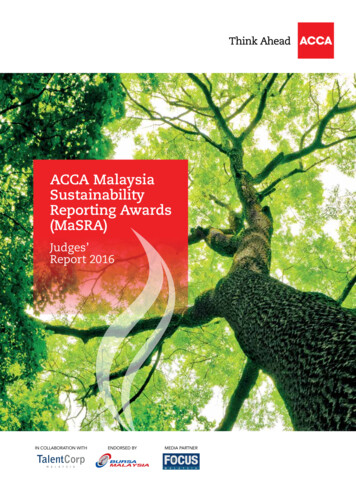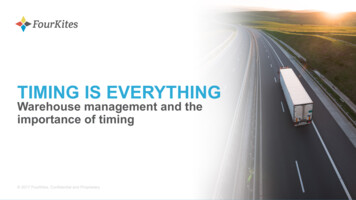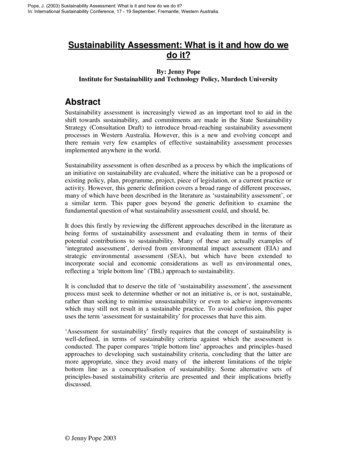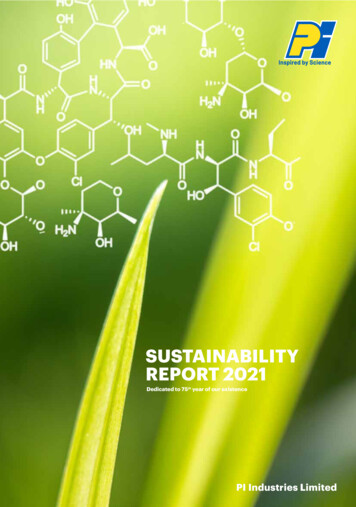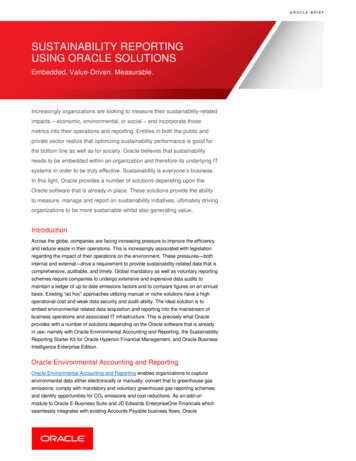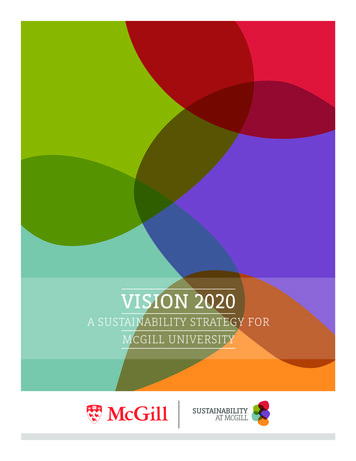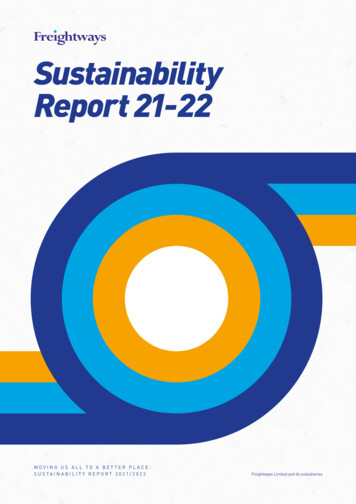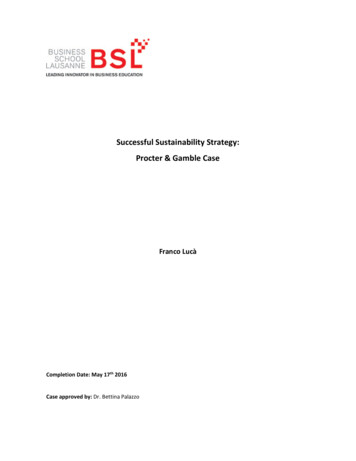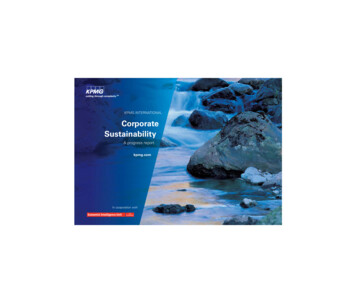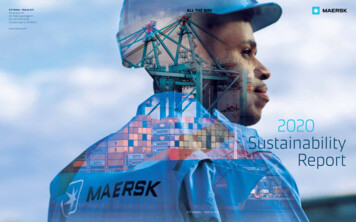
Transcription
A.P. Møller - Mærsk A/SEsplanaden 50DK–1098 Copenhagen KTel. 45 33 63 33 63Company reg. no. 22756214ALL THE WAYwww.maersk.com2020SustainabilityReportA.P. Møller - Mærsk A/S
2A.P. Moller - MaerskSustainability Report 2020ContentsIntroductionTable ofcontents4Introduction4Business model and performance highlights6Letter from our CEO8Strategy, governance and materialityStrategic sustainability prioritiesResponding to a pandemicResponsible business practicesProgress overviewData and assurance3Decarbonising logistics, page 1612 Strategic sustainability priorities13 Enabling sustainable trade16 Decarbonising logistics23 Sustainability in our end-to-end offerings25 Responding to a pandemicSafety, page 3029 Responsible business practices30Safety38Air emissions32Responsible ship recycling39Ocean health34Diversity and inclusion40Anti-corruption36Employee relations41Responsible tax37Responsible procurementAbout the reportThis is the Annual Sustainability Report of A.P. Møller - Mærsk A/S(hereinafter referred to as A.P. Moller - Maersk or Maersk as theconsolidated group of companies and A.P. Møller - Mærsk A/S as theparent company). The report covers activities in the 2020 calendar year.Our approach to sustainability reporting is to focus on material issuesand activities, in line with stakeholder concerns and relevance to ourbusiness and society in terms of context, completeness and balance. Westrive for optimal accuracy, timeliness, clarity and reliability in the waywe communicate. This report also represents our statutory statement onsocial responsibility, underrepresented gender and diversity in accordancewith sections 99a & b and 107d of the Danish Financial Statements Act.As a supplement to the Annual Sustainability Report, we prepare an ESGdata overview of key performance indicators as well as SASB and TCFDindex tables. The ESG overview can be downloaded at: https://investor.maersk.com under files for download at the release of the Annual Report.Responding to a pandemic, page 25Previous years’ data and our UN Global Compact Communication onProgress table are also available online. Please eports.Enabling sustainable trade, page 1342Progress overview44Data and assurance44Performance data46Sustainability accounting principles48Independent assurance report
4A.P. Moller - MaerskSustainability Report 2020IntroductionBusiness model and performance highlightsIntroductionWhat we do andhow we create valueStrategic sustainability prioritiesResponding to a pandemicVALUE CREATEDFor our peopleOur people bring key skills and capabilities to our businessand in turn we must keep them safe and engaged whileoffering interesting career paths in enabling global trade.Read about our work on safety on pp. 30-31.A.P. Moller - Maersk enables its customers to trade and grow by transportinggoods anywhere. We work to provide customers with end-to-end logisticsproducts and services, taking complexity out of global value chains.Stakeholder relationshipsand partnershipsTechnology and ITExportterminalOur assets, supplier relationshipsand expertise in end-to-end deliverynetworks ensure our customersresilient supply chains.Warehousing &distributionData and assurance2020performancehighlights39,740RevenueOur brandFinancial capitalFor more than a century, we have builtpartnerships with customers, enabling themto prosper by facilitating global trade.We have a strong balance sheet andare committed to remaining investmentgrade-rated.EBITDA8,226Relative CO2reduction46.3%(USD million)(percentage vs2008 baseline)For the environmentOur industry is a significant contributorto global GHG emissions, and we arecommitted to decarbonising ouroperations. through investments andcollaboration. Read more on pp. 16-22.OceantransportNET ZERO CO2Greenhouse gasemissions(1,000 tonnes CO2 eq.)Direct emissions(scope 1)RailfreightStart destinationProgress overview(USD million)Assets and end-to-enddelivery networkTechnology and IT are key toenhancing our operationalperformance and solutionsfor our customers.We rely on constructive relationshipswith e.g. customers, suppliers, peersand authorities to maintain supportiveframework conditions. See our keypartnerships on p. 10.Responsible business practicesIndirect emissions(scope 2),location-basedRESOURCESIn our transformation to becomethe global integrator of containerlogistics, we continue to innovateand grow shareholder value.Importterminal30519,017Value chainemissions(scope 3)For our investors33,902See more performance data on pp. 44-45NET ZERO CO2Our people and cultureNatural resourcesFor societyFor our customersOur talented and diverse group of80,000 employees live our corevalues every day as they helpcustomers realise their ambitions.Our business relies on natural resources,in particular steel (the main componentof our vessels) and oil for fuel.With global presence and potential for impact comesthe responsibility and opportunity to ensure open,inclusive and sustainable trade. Read more on pp. 13-15.By connecting and simplifying our 70,000customers' supply chains, we enable themto focus on growing their business.Warehousing& distributionCustomer'swarehouse or shopMARKETEnd destination5
6A.P. Moller - MaerskSustainability Report 2020IntroductionLetter from our CEOIntroductionStrategic sustainability prioritiesResponding to a pandemicResponsible business practicesProgress overviewData and assurance7" I strongly believe that we, as an industry leaderand with the resources available to us, have anobligation to do all we can to get to a carbonneutral fleet as fast as possible."and inclusive trading system. Towards this end,we work to reduce complexity by digitisingglobal trade. As physical lockdowns movedmore customers online during 2020, we sawsignificant growth in our digital solutions, suchas Maersk Spot, the Maersk app and Twill.Letter fromour CEO2020 was year of contrasts. While the pace ofmodern life slowed down due to restrictionsor lockdowns, trends and change agendas ondigitisation and sustainability acceleratedduring the COVID-19 pandemic. While someindustries came to a sudden halt others surged.And while lives and livelihoods were lost attragic rates, human ingenuity and adaptabilityrose to new heights.Even though borders closed, air trafficstopped and roads blocked across the globe,global supply chains remained open. Thegeographical presence and leadership positionof A.P. Moller - Maersk (Maersk) enabledus to find new ways of keeping essentialgoods moving for customers and societies,as they kept businesses running and foughtthe virus. Just as we in our company focusedon protecting our employees, who play aninstrumental role in moving global trade whiledealing with long shifts at sea and disruptive,new routines on shore. I remain tremendouslyproud to experience how we responded tothis global emergency by showing resilience,innovation and a natural willingness to care forcolleagues, serve customers and help societyrespond and recover. I am at the same timesaddened by the fact that the COVID-19 virushas claimed the lives of some of our colleagues.Sustainability as a fully integratedbusiness priorityEven as the urgent priorities of the pandemicand our business transformation have kept usbusy, sustainability remains at the top of ouragenda, and we continue our commitment andsupport for the principles of the United NationsGlobal Compact. We see an acceleration inexpectations from all stakeholders, not leastcustomers, investors and employees. In 2020,we updated our sustainability priorities to furtherintegrate sustainability into our business strategy,and we are accelerating our efforts todecarbonise shipping.The pandemic has only reinforced our role inmultiplying the benefits of trade and in makingthese accessible to all so that more peopleand businesses can be part of a global, openA step-up on decarbonisationDecarbonising logistics is where we can andmust move the needle the most for sustainabledevelopment. Maersk remains fully committedto our ambition of eliminating greenhousegas emissions, as we continue to work towardsnet-zero emissions from our ocean activitiesin 2050; a 60% relative reduction in emissionsfrom shipping by 2030 compared to 2008, andinvestigating how we can expand our net-zeroambition to cover our full operations and valuechain across all emission scopes. We recognisethat climate action is a strategic imperative forour company and have redesigned our organisationin order to embed the agenda and ensurecollaboration across our business activities.In 2020, we began a process to step up ourefforts on decarbonisation. I strongly believethat we, as an industry leader and with theresources available to us, have an obligation todo all we can to get to a carbon-neutral fleet asfast as possible. We will not be using transitionfuels, but will instead leapfrog directly to netzero fuels. The launch of the Mærsk Mc-KinneyMøller Center for Zero Carbon Shipping in 2020,made possible by our majority shareholder, theA.P. Moller Foundation, together with a group ofindustry-leading players, is an important stepin aid of our commitments.As Maersk 's presence grows on land tooffer integrated logistics solutions, so does ourresponsibility and commitment to help ourcustomers decarbonise their global supplychains end to end. This is an integral part of ourstrategic promise of serving all our customers'transportation and logistics needs, and we willengage with customers and industry partners todevelop standards and solutions to support thisgreen transition.Strengthening the foundationWe are strengthening the responsible businesspractices that constitute the foundation ofour sustainable end-to-end offerings to ourcustomers as well as our own operations.Guided by our core company values, ourcommitments to international standards andguidelines, and with high expectations fromcustomers, investors, regulators, employeesand other stakeholders, we continue to addresschallenges across our operations and supplychains, including key areas such as shiprecycling and safety.We have taken on the task of using ourleverage to drive responsible practices in theship recycling industry. After four years in Alang,India, we know that this is possible, and withstill larger vessels in our fleet nearing end oflife, it is imperative that we create opportunitiesfor responsible ship recycling at yards outsideOECD countries. We are engaging activelyto find options that ensure enforcement ofinternational conventions while also enablingglobal opportunities for responsible shiprecycling that benefit both shipowners andlocal communities.Failing safelyThe foundation for safety in Maersk is to buildcapacity for 'failing safely', acknowledging thateven while all precautionary measures mustbe applied, some accidents and incidents arelikely to still occur, but the implications of theseshould be as small as possible.One of our contractors lost his life whileworking for Maersk in 2020. This saddens medeeply and emphasises that we need to domore to manage our risks and build the capacitywe need to avoid such a tragic event.To this end, we centralised the organisation ofour safety work in 2020. The new organisationreinforces that Maersk has one shared safetystrategy which is implemented and enforcedequally across the company.The decision is driven by the need to matchand mirror the integrated company that Maerskis becoming, and also by the need to establisha stronger link between the company’s strategicpriorities and the implementation level, toensure that we continue to learn and managerisks by listening to our frontline employees.Most importantly to ensure the continuoussafety and security of our people, but also toassure our customers that this is the casewhen they leave their supply chain obligationsin our hands.In simple terms, we will not be satisfied untilwe reach our ambition of eliminating fatalitiesand severe injuries and provide safe and resilientproducts and services to our customers.Social movements a timely reminder2020 saw the renewed strength of socialmovements to promote race and gender equality.Our global presence means that we areaffected by events and movements regardlessof where they take place. Notable examplessuch as Black Lives Matter in the US, which hasspilled over to many other countries, and newwaves of #metoo serve as timely remindersthat we must continue conversations on diversityand inclusion and take action where needed.Maersk is a values-driven company. We treatour colleagues and partners with respect anddignity, and we do not tolerate discrimination orharassment of any kind. It is as simple as that.In 2020, we have addressed these issuesin our organisation and clarified how we dealwith them. We have clear policies in place anda whistleblower system with a range ofreporting options.For Maersk, 2020 was a year of crises inglobal health and economies, lockdowns,closed borders and distress – but also of newopportunities for our company, acceleratedprogress towards our strategic goals and achance to see what we as leaders and ouremployees are truly capable of.In the coming year we will be applying ourcapacity to the global distribution of vaccinesand to keeping supply chains open, and as suchwe will continue to play our part in enablingopen, inclusive and sustainable trade – together.Søren SkouCEO of A.P. Møller - Mærsk A/S
8A.P. Moller - MaerskSustainability Report 2020IntroductionStrategy, governance and materialityStrategy, governanceand materialityAs sustainability becomes a strategic imperative for A.P. Moller - Maersk,we have updated our sustainability priorities and governance to underpina more targeted and integrated approach.A.P. Moller - Maersk's (Maersk) approach tosustainability is to take responsibility in line withour values and commitments, and to assume aleadership position on global issues where wehave the necessary competencies and leverageto make a real difference. We do this throughour business activities and in line with ourbusiness strategy, while we listen carefully tostakeholders' expectations.In 2020, this approach has led us to reassessand elevate our ambitions on sustainability,which are now further integrated in our GlobalIntegrator strategy and the transformation ofMaersk to one company.We see continued strong momentum onthe sustainability and ESG (Environment,Social, Governance) agenda in society asthe expectations and ambition levels of ourcustomers, investors, regulators and civilsociety continue to rise. This impacts not onlyMaersk, but importantly also our customers,who are converting the expectations, risks andopportunities for sustainable products in theconsumer market into requirements for usto deliver decarbonised and increasingly alsoend-to-end responsible supply chain solutions.Almost three out of four of our key clientsseriously consider sustainability in their supplychains, and 90 of our top 200 customers haveset or are in the process of setting ambitiousscience-based or zero carbon targets.ESG is moving from the niche confines ofsocially responsible investments to a focuson financially material impacts that matter tomainstream investors. The financial communityexpects companies to demonstrate a credibleplan that aligns with the Paris Agreement’s1.5-degree target across the full supply chain,and to take into account the physical effectsof climate change and secure a viable businessfor the future.Furthermore, lawmakers – particularly theEU – are moving rapidly on legislation relatedto sustainability, also on issues beyond climatechange and decarbonisation. For example, theEU is enacting the taxonomy on sustainableactivities, which through demands on thefinancial community will push requirementsfor transparency on ESG data across businesssectors. Further initiatives are in the EU's pipeline,including increased reporting obligations,ensuring sustainability in corporate governanceand not least, mandatory social andenvironmental due diligence in supply chains.As a consequence, sustainability is becomingnot only a values-based responsibility for us butalso a commercial and strategic imperative forIntroductionDecarbonising logisticsSustainability in our end-to-end offeringsResponsible business practicesResponding to a pandemicResponsible business practicesProgress overviewData and assurance9Our sustainability governance frameworkBoard of DirectorsTransformation & Innovation Committee, Audit CommitteeA.P. Moller - Maersk Executive Leadership TeamKey programmesGoverned byKey external policies and commitmentsDecarbonising logisticsDecarbonisation SteerCoThe Paris AgreementIMO Strategy on Reduction of GHG Emissions from ShipsExecutive sponsors: Henriette Thygesenand Vincent ClercThe Intergovernmental Panelon Climate Change (IPCC)Task Force on Climate-related Financial Disclosure (TCFD)Commit* RuleUN Global CompactIMO Ballast Water Management ConventionExecutive sponsor: Morten H. EngelstoftIMO SOLAS ConventionIMO MARPOL Convention Annex VIEU Sulphur Directive 2016/802IMO International Safety Management (ISM) CodeHealth, safety and environmentUNCLOSResponsible ship recyclingResponsible ship recycling SteerCoHong Kong ConventionUN Guiding Principles on Business and Human RightsA.P. Moller - Maersk ResponsibleShip Recycling StandardILO ConventionsOECD Guidelines for Multinational EnterprisesCommit RuleUN Global CompactUN Guiding Principles on Business and Human RightsExecutive sponsor: Ulf HahnemanILO ConventionsOECD Guidelines for Multinational EnterprisesExecutive sponsor:Henriette Hallberg ThygesenEmployee relations (labour rights)Maritime Labour Convention, 2006 (MLC, 2006)Anti-corruptionCommit RuleUN Global CompactExecutive sponsor: Caroline PontoppidanResponsible procurementResponsible taxHuman rightsOECD Guidelines for Multinational EnterprisesThe US Foreign Corrupt Practices Act and the UK Bribery ActCommit RuleUN Global CompactUN Guiding Principles on Business and Human RightsExecutive sponsor:Henriette Hallberg ThygesenILO ConventionsOECD Guidelines for Multinational EnterprisesMaersk Tax PrinciplesB Team's ResponsibleTax PrinciplesOECD Guidelines for Multinational EnterprisesExecutive sponsor: Patrick JanyA.P. Moller - Maersk Code of ConductUN Global CompactUN Guiding Principles on Business and Human RightsExecutive sponsor: Caroline PontoppidanDiversity and inclusionEnabling sustainable trade: Sustainability priorities for the Global IntegratorStrategic sustainability prioritiesDiversity & inclusion policyOECD Guidelines for Multinational EnterprisesUN Global CompactUN LGBTI Standards for BusinessExecutive sponsor: Ulf Hahneman* Commit is Maersk’s core governance framework prescribing how we work including the A.P. Moller - Maersk Code of Conduct and 23 policies (known as "Rules") covering Business Ethics and Governance topicsMaersk as part of our proposition to customers,capital providers, employees and regulators,and foundational to our broader societal licenceto operate.Defining a sustainable business strategyOur sustainability efforts have matured over thelast decade with increasing ambitions matchingthe maturity of the field and expectations ofour leading customers and key stakeholders.The sustainability strategy and ambitions wedefined in 2017 have served well in creatingpositive impact along multiple dimensions.We have made significant progress on the fourshared value priorities that we identified in2017 as those where Maersk has the strongestpotential to contribute towards the SustainableDevelopment Goals, leveraging our businessexpertise and assets: decarbonising logistics,multiplying the benefits of trade, contributingto halving food loss, and leading change in theship recycling industry. We have progressivelyembedded responsibility for sustainabilityimplementation into core functions andbusiness areas, and we are now ready tointegrate our sustainability priorities as anembedded part of our business strategy. We will increase our focus on end-to-endsustainability in our offerings in response tothe increased responsibility and opportunity tomanage supply chain risks for our customers aspart of our Global Integrator business strategy. We continue to ensure responsible businesspractices across our operations with cleargovernance, accountability, and transparencyon policies, commitments and performance.In 2020, we have defined updated sustainabilitypriorities for the Global Integrator strategy:Enabling sustainable trade by decarbonisinglogistics, sustainability in our end-to-endofferings and responsible business practices. We will take leadership on decarbonisinglogistics as our single most important strategicsustainability priority.Our commitments on inclusive trade andfood loss are fully owned and driven in line ofbusiness, and remain part of our reporting onsustainability as they are integral to our strategyand what we do as a business. Responsibleship recycling is also fully owned in line ofthe business and part of ensuring responsiblebusiness practices.
10A.P. Moller - MaerskSustainability Report 2020Governance structures in placeGovernance of sustainability in Maersk isoverall anchored with the Board of Directors(Transformation and Innovation Committee)and the Executive Leadership Team. Undertheir oversight, our sustainability governanceand integration approach secures executiveownership of sustainability and involvementin setting sustainability priorities and drivingimplementation, while also embeddingsustainability in core processes related to strategy,performance, planning and risk management.In 2020, we revised the governance structureon decarbonising logistics to support anacceleration of our efforts. This includesan expanded steering committee with twoexecutive members serving as an accountabledecision-making forum, supported by a broaderdecarbonisation advisory group, preparing workplans and strategies and ensuring alignmentacross the company. The advisory grouphas defined a set of workstreams coveringcommercialisation, vessel design, energyefficiency, fleet and network, retrofitting, newfuels, sourcing and framework conditions.Stakeholder engagementFive stakeholder groups are prioritisedfor sustainability strategy, reporting andengagement: customers, employees, investors,authorities and NGOs/thought leaders. Issueowners and leaders across Maersk engage withrepresentatives of these groups as part of theirIntroductionStrategy, governance and materialitydaily work, and we incorporate feedback fromthe regular engagements in determining themateriality of sustainability issues and settingstrategic direction for our work.In 2020, our engagement with customerson sustainability has focused particularly onproviding transparency on responsible businesspractices and visibility of logistics emissions,as well as on sustainability innovation,encompassing our currently available andfuture solutions for net zero carbon shipping.Our engagement with investors, banks andinsurers on ESG/sustainability has likewisecentred on decarbonisation, but ship recycling,air emissions, ocean health and safety are alsotopics important to our large investors.We engage actively in many partnerships onkey sustainability topics (see overview below).In addition, we are active members of industryorganisations such as Danish Shipping and theWorld Shipping Council.Materiality: Working on issues that matterIn line with our practice of reviewing materialityannually, we have updated our overview ofmaterial sustainability issues drawing on theoutcome of stakeholder engagement andresearch conducted as part of the update ofstrategic sustainability priorities. The researchhas provided insights into expectations, leadingpractices and emerging topics across customers,investors, and broader society, and has addedto our existing knowledge and analysesfrom previous years including an analysis ofhow Maersk relates to the UN SustainableDevelopment Goals.Revisions and additions to our modelWe are simplifying our representation ofmaterial issues to reflect our new strategicapproach, highlighting the issues that arestrategic imperatives and hold the greatestpotential for value creation: decarbonisation,end-to-end sustainability in our offerings, andsustainable trade. Furthermore, we continueto be guided by the perspective of doublemateriality in determining how sustainabilityissues may constitute responsibilities or risks,enabling us to understand where Maersk hasa responsibility to mitigate potential negativeimpact on society or the environment andwhere issues may pose significant risk toour business.Our disclosure of sustainability issues aspotential risks to our business draws on ourenterprise risk management process, whichassesses top risks to achieving our businessplan within a 5-year horizon. The sustainabilityissues that are assessed as among our toprisks are safety (failure to ensure the safetyand security of our employees), climate change(failure to decarbonise our end-to-end supplychain at a speed that matches our customers’and investors’ expectations), and anti-corruption(being involved in a large compliance case).IntroductionStrategic sustainability prioritiesResponding to a pandemicResponsible business practicesWe remain engaged in a wide range of partnerships and are members of different organisations working towards sustainability goals.11Based on research, stakeholder dialogue and management prioritisation, we determine how sustainability issues are material to Maersk by applyingcriteria and filters of risk, responsibility and strategic opportunity assessment. The most material issues are outlined below and reported on in relevantsections of this report.Sustainable andinclusive tradeClimate change /Decarbonising logistics End-to-end responsibilityin supply chainsSafetyResponsible ship recyclingResponsibleprocurementDiversity & inclusionAir emissionsResponsible taxEmployee relationsOcean healthDisaster responseHuman rightsAnti-corruptionChanges to reporting as a result of strategy and materiality reviewOur commitments to open, inclusive and sustainable trade are owned inline of business and delivered in particular through strategic investments indigitising global trade. We continue to report on our 2025 commitments aswell as on key societal trends in global trade.Air emissions continue to be a material responsibility topic, while the potentialfinancial risk impact of IMO 2020 (lack of enforcement of the cap on sulphurin fuel oil) as reported on in previous years is reduced.We no longer report on food loss as a separate disclosure topic but incorporatehighlights in this year’s report as part of the chapter on sustainable trade.Responsible ship recycling continues to be a material responsibility topicwhich we report on in the responsible business practices section.We no longer report on human rights as a separate issue, but have integratedhuman rights commitments and frameworks such as the UN guiding principleson human rights and business into our governance approach and issuemanagement processes. See overview to the right.Responsible TruckingData and assuranceMaterial sustainability issues 2020Supply chain sustainability risk is becoming more strategically relevant forus in our customer offerings. We report on it in the chapter on end-to-endsustainability in our offerings.Key partnershipsProgress overviewHuman rights in this reportThere are many aspects of our business that touchon human rights. Commitment to human rightsis expressed in the A.P. Moller - Maersk Code ofConduct and our human rights due diligence isdescribed on the following pages of this report.Air emissions The right to the highestattainable standard of health.38Safety The right to life and the right tothe highest attainable standard of health.30Diversity and inclusion The right to freedom from discriminationand the right to family life.34Responsible procurement Human rights principles and standardsrelated to labour.37Responsible ship recycling Human rights principles and standardsrelated to labour, in particular the right tolife and the right to the highest attainablestandard of health.32Employee relations Human rights principles and standardsrelated to labour, for example freedom ofassociation and collective bargaining, equaltreatment, child labour, forced labour, workinghours, compensation, privacy, rest and leisure.36
12A.P. Moller - MaerskSustainability Report 2020Strategic sustainability prioritiesEnabling sustainable tradeIntroductionStrategic sustainability prioritiesResponding to a pandemicResponsible business practicesProgress overviewData and assurance13Enablingsustainable tradeAs the global integrator of container logistics, we workto ensure that trade is open, inclusive and sustainable.Wherever you live, chances are that your livingconditions are closely tied to how much andhow well your country trades. Since 1980,Bangladesh has seen a four-fold increase inexports with poverty rates declining from 45%to less than 15% today1. In South Korea, anothertrading nation, an average employee generates13 times more wealth in a day than she did fiftyyears ago2. In Turkey, the typical consumer canattribute a third of their real income to lowerprices enabled by e trade, decarbonisation andsustainability in our end-to-end offeringsare strategic imperatives to our business.Lessons from a pandemicDuring 2020, we saw how fragile this progresscan be – a real-time demonstration of whatcan happen when economies shut down.The International Labour Organization hasestimated that as a result of the pandemic,global labour incomes have declined by morethan 10% in 2020, corresponding to hundredsof millions of jobs4. The economic hardshipscaused by COVID-19 are not equally distributed,and inequalities within and among countriesare likely to widen. According to the World Bank,during the pandemic the number of peopleliving in extreme poverty (less t
80,000 employees live our core values every day as they help customers realise their ambitions. Start destination End destination Our brand For more than a century, we have built partnerships with customers, enabling them to prosper by facilitating global trade. For our people Our people bring key skills and capabilities to our business
